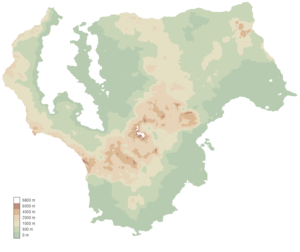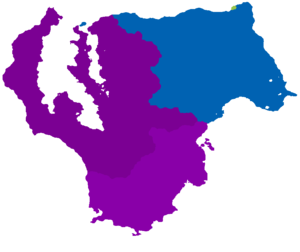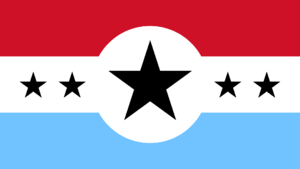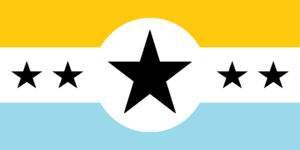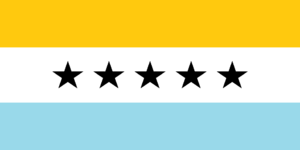Aquaria
|
Republic of Aquaria
Akuarioa
|
|||||
|---|---|---|---|---|---|
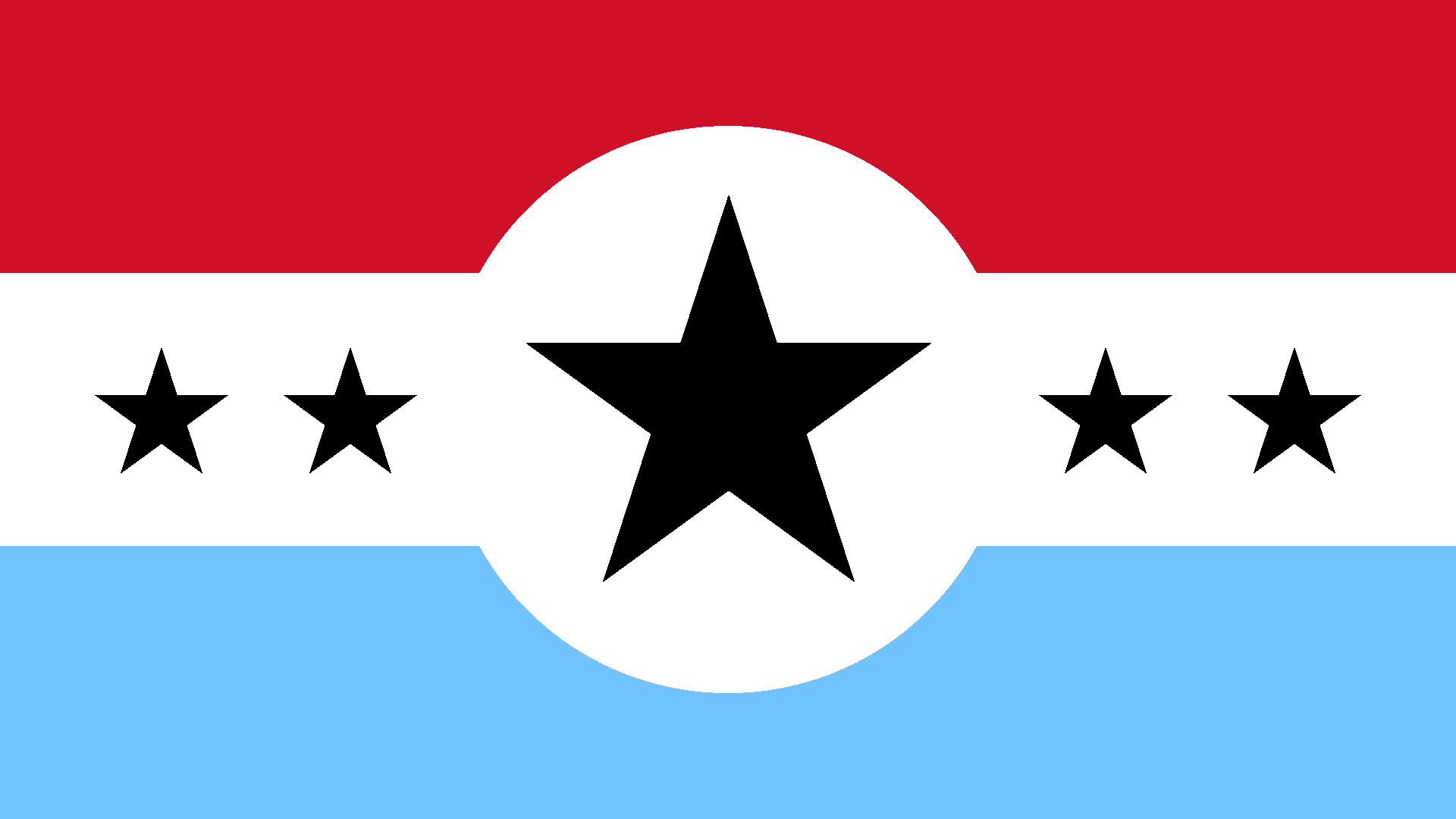 |
|||||
| Motto | “Ejiave Odanibmoc" (Onwards Together) |
||||
| Common Name | Aquaria | ||||
| Anthem | “Zeoulia Free” | ||||
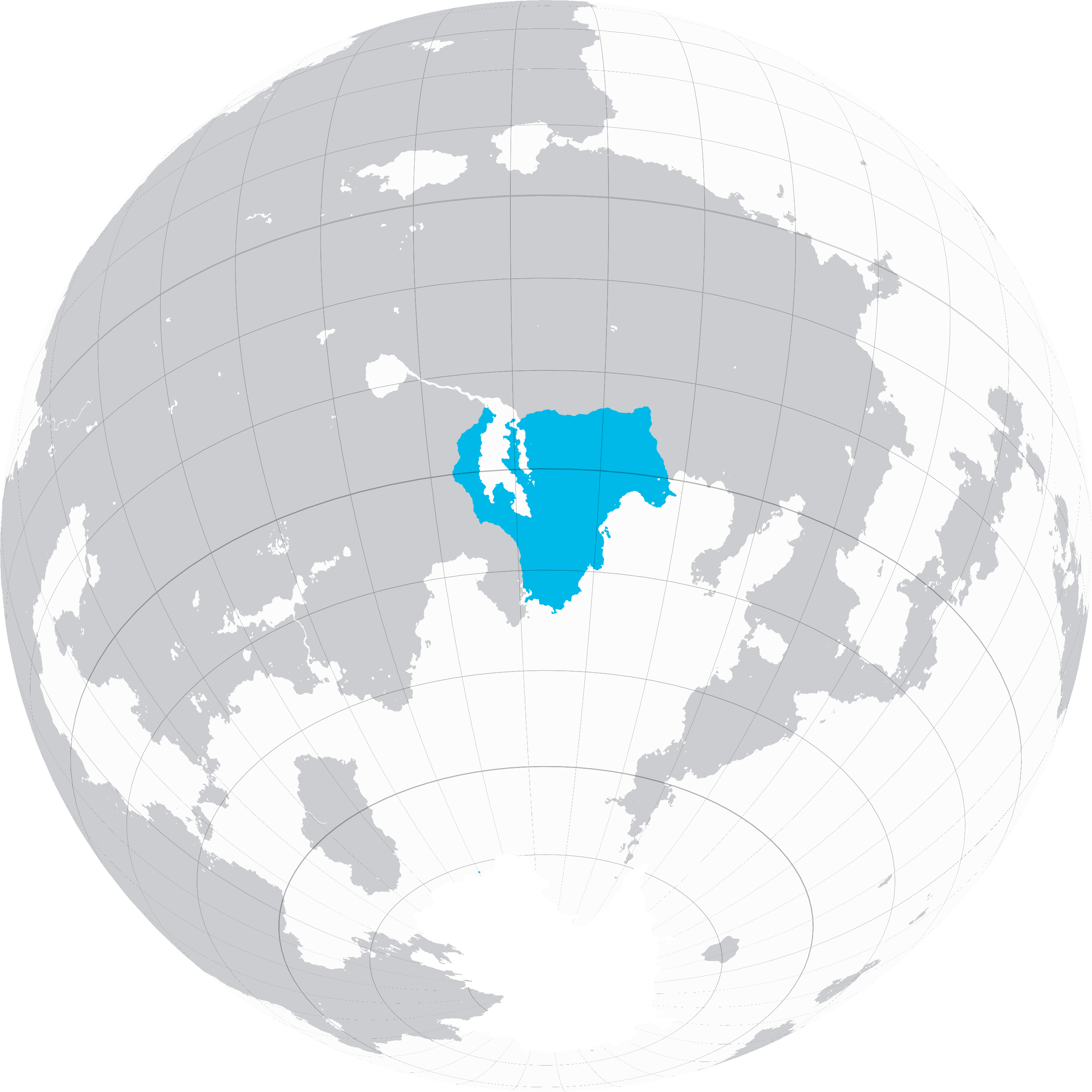 |
|||||
| Demonym | Aquarian | ||||
| Official languages | Zeoulian, Sarconian | ||||
| Currency | Aquarian Kerbit | ||||
| Politics | |||||
| Capital | Ajemla | ||||
| Government | Federal Parliamentary Republic | ||||
| Foundation | 2050 | ||||
| Preceded by | Zeoul, Sarconia | ||||
| Followed by | Sarconia | ||||
| Demography | |||||
| Ethnicities | Zeouli 62.7% Dorvic 24.4% Baskian 11.2% Feguan 0.2% Other 1.5% |
||||
| Population | 10,233,900 | ||||
| Area | 31,836km² km² | ||||
Aquaria was a nation located in Doren on the coast of Greater Baskay Bay, to the west of Owlia. Aquaria was formed by a political union between Zeoul and several south Sarconian provinces in 2050, which continued until 2115. It covered an area of 36,646km2 and had a population of 10.23 million, making it one of the Kerbin's larger nations at the time of its dissolution.
Most of its population was concentrated in the Zeoulian Heartlands split from the rest of the nation by southern arm of Zeuldopine mountains which divide the country both culturally and linguistically. North of these mountains, the Great Lakes transitioning into the plains of Doren were more decentralised and sparsely inhabited, with a large Sarconian community.
Its capital was Port Ajemla, situated in Ajemla Bay at the juncture between Nomlas and Phaeg. Other major cities were Arrataxt, Choppe, Nidapse and Delge.
Aquaria was a founding member of the Joolian Federation. While not officially attached to any power bloc on Kerbin, it maintained two way defensive alliances with both local continental powers such as Owlia and Fegeland as well as several nations in Kafrica and elsewhere.
During the Greater Kerbin War it aligned itself with the United Front. Aquaria was a highly developed and spacefaring nation, maintaining colonies on 7 bodies and was one of the pioneering forces behind the colonisation of the outer system. It was ranked as "very high" on the Kerman Development Index.
Etymology
The name Aquaria was adapted from the shared Zeouli and Sarconian word Akuarioa, loosely meaning "area between two seas". Its first usage in the context of a prospective united nation was by diplomat Lamphred Kerman during discussions between Zeoul and the city state of Arrataxt in 2048, in the prelude to the country's formation.
| “ | Your city's Khural is right. To unite this Aquaria would be unprecedented - but the Decline is behind us. The past is full of austerity and precedented things, my friends. Does the future need to be as well? | ” |
| —Lamphred Kerman, in discussion with the Khural of Arrataxt, 2048 | ||
The term spread rapidly in the following months, and in 2050 was officially adopted to describe the political union between the Zeoulian and Sarconian territories and the nation which emerged from it.
Geography
The Republic of Aquaria is located in southern Doren, on the coast of Greater Baskay Bay. The vast majority of its territory falls between [-] latitude and [-] longitude. With an area of 36,646km^2 at the time of its dissolution, it was the 10th largest nation on Kerbin, ahead of New Grestin and behind the Reciprocity. It was bordered by Hermia to the east and had Owlia lying to the west, with various states of Central Doren on its northern borders throughout its history.
Within the Republic, the nation is divided by many natural landmarks. Nomlas, Phaeg, Rimor and Onifelge, collectively referred to as the Zeoulian Heartland, are separated from the rest of the nation almost entirely by the southern arm of the Zeuldopines, the world’s largest unbroken mountain range. This natural boundary, along with a series of fortifications known as Harmick's Wall, is often credited with the continued survival of the Zeouli people throughout history, deterring northern nomadic tribues from reaching the sea.
To the north, the Great Lakes lie almost entirely within the nation's borders, with its western shore occupied by the province of Dziak. Connected to the Sarconian Sea through a narrow pass, they combine to make up Kerbin's 3rd largest inland body of water by area, and largest by coastline. The lakes are split by Cape Laroc, with the island of Arrataxt by its tip, historically the capital and seat of power in Sarconia in feudal times. In the east, the drier plains of Central Doren extend down into Calyx and Amerb, transitioning into greener fields nearer the coast of Ahcurt and Anidem.
Aquaria also held jurisdiction over Fish Island, an extremely small detached iceberg off the coast of the South Pole. It is entirely composed of compacted snow and ice, and is almost completely flat. Raised above the sea by sheer cliffs over 30m tall, the island is only accessible by air under normal circumstances.
Climate
###
Biodiversity
###
Urban Areas
###
Politics
Government
### Historically each state was an individual, albeit small, country in itself, which would form loose alliances amongst themselves on occasion. In the current area, all have been unified since 2050, when each state came together and united into one nation, putting forth elected politicians to form the Aquarian Council. ###
Subdivisions
Under its original constitution, Aquaria’s 10 provinces are divided into 5 separate administrative states; Nomlas, Onifelge, Ahcurt, Corain and Amerb, which each hold a degree of local authority. After the neighbouring province of Phaeg’s initial hesitance to join the Union, it was integrated under slightly different terms in 2053, and for some matters regarded as part of Nomlas while retaining its own separate local governance from it to a degree greater than any other states.
Each state is exactly equal in all rights, with each having its own capital city, and minor council overseeing matters directly related to their own state.
Foreign Relations
Throughout its existence the Republic of Aquaria continued the isolationist approach to global relations of its predecessor. The nation would rarely exert any influence beyond Greater Baskay Bay, but forged close ties with local Owlia and later Fegeland on continental Doren. Within Baskay however, Aquaria formed one half of an unofficial peacekeeping agreement alongside Owlia. intervening in and successfully overturning the Zokesian occupation of Fish Island, supporting the Coalition in the Delras Civil War, and being responsible for the defense of several smaller local states such as Hermia during the Great Crusade.
Demographics
Languages
###
Education
###
Religion
###
Age
###
Military
The Aquarian armed forces were split into three branches. Mainly being deployed as peacekeeping forces, it participated in six major military actions, liberating Fish Island from Zokesian occupation, fighting alongside Owlia during the Delras Civil War, the First Sarconian Counterinsurgency, peacekeeping operations in Fegeland during the TIGER uprisings, the Second Sarconian Counterinsurgency, and the Fall of Aquaria. At the time of its dissolution, It was made up of just under 490,000 personnel.
In addition to its three main services, the government agency C140 also operated a small and diverse armed special forces group under the Republic. Rarely seen, these ranged from helicopters and small infantry units to orbital Reconnaissance Frigates.
Air Force
The Aquarian Air Force, or AQAF, was the most well funded branch of the Aquarian Armed Forces, and charged with protecting sovereign airspace and if necessary conducting offensive operations in foreign regions.
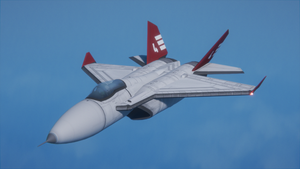
The Aquarian Navy is comprised of 50 ships currently. It operates 4 different classes of ships.
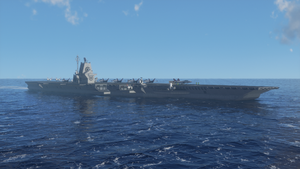
Army
The Aquarian Army currently has 150 armoured vehicles in operation, with plans for more designs.
Vehicles Currently In Operation: M51 Corsair APC-94 Mako
Economy
Each state‘s economy has different focuses to take advantage of the geography of the land, with the southern states of Nomlas, Onifelge and Zheoul specialising mainly in fishing, agriculture, and ship construction, while more northernly states like Amerb, Corain and Artso being more industrialised, using the areas higher in resources to set up automated mines and quarries providing materials for large multipurpose factories.
Taxation
To help prevent poverty, products necessary to healthy life, such as high carb foods and foods containing vital minerals, have a lower VAT. To prevent exploitation and potential re-defining of what is eligible for this, all products are reviewed by an independent board.
Transport
###
Energy and Infrastructure
The National Power Grid is a partially state owned ### nuclear reactors something ### embedded deep within the Zeuldopines mountains to minimise the effects of fallout if one should fail. Each reactor is networked together with all others and the nation as a whole operates on a single electrical grid. There are other, private power stations using many methods of generation. ### methods that could potentially expel polluting materials within a certain radius of the sea or the Sarconian Lakes. ### are banned
Trade
###
Science
###
History
In 2062, the Republic of Aquaria, acting alongside long time ally Elysium, intervened in and successfully overturned the Zokesian occupation [1] of Fish Island, at the time territory of Spearka. While only a minor conflict, the war would prove notable for a handful of events and landmarks. Firstly, the conflict marked the first military deployment of Aquarian forces since it’s formation and is pinpointed by some as a turning point in Baskay’s history, after which the turbulent region would enjoy a period of relative peace for several decades. Secondly, the war would be the only military defeat suffered by Zokesia over its 50 year history. Thirdly, some days after the conclusion of the initial and only engagement of the conflict, the island would be the site of the first ever significant use of orbital bombardment in Kerbin’s history, when the NMC launched over 2000 impactors at the iceberg, ostensibly to prevent further escalation.
Ancient and Pre-Unification History
During the Stone Age, hunters and fishers had inhabited Aquaria, thriving off the coast and the plentiful hordes of beast roaming the plains. around 20,000 BC, when Kerbals began farming, Hunters began to give up their weapons for farming equipment and took to the Northern lake, and small communities sprang up along its banks, where it provided water to sustain the kerbals and crops. Past the narrow valleys and into the crater, great cities slowly built up, and would come to be the center of Sarconia. Meanwhile, the Empire of Zeoul established dominance over the south while still in its infancy, and commerce flourished, with Port Ajemla at as a major hub of society and trade, much like now, and a capital cut out of the mountains straddling the coats and the plains that has been in ruin for centuries. Ships would traverse all of Greater Baskay Bay, on months long voyages, and return laden with exotic goods from across the world.
Notable Events
- Formation
- Launching of Arc Station
- Joining the Joolian Coalition
- Colonisation of Vall
- Fish Island
- First and second Sarconian counterinsurgencys
- Withdrawal from Zaror
- Fall
About The Flag
The national flag, representing the union of the five founding states and two major cultures, orange for Sarconia and blue for Zeoul. Eventually, the central star would be enlarged to represent Port Ajemla’s increasing position of importance at the behest of the Zeouli-centric ruling group within the nation. Later still as the divide between the northern and southern states widened the orange would be replaced entirely with Zeoulian red, in a move that for many signified the end of the union under its original principles of equality.
